国外生态农业模板共38页文档
- 格式:ppt
- 大小:4.05 MB
- 文档页数:38
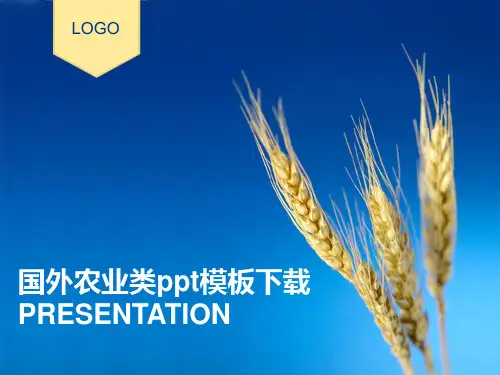
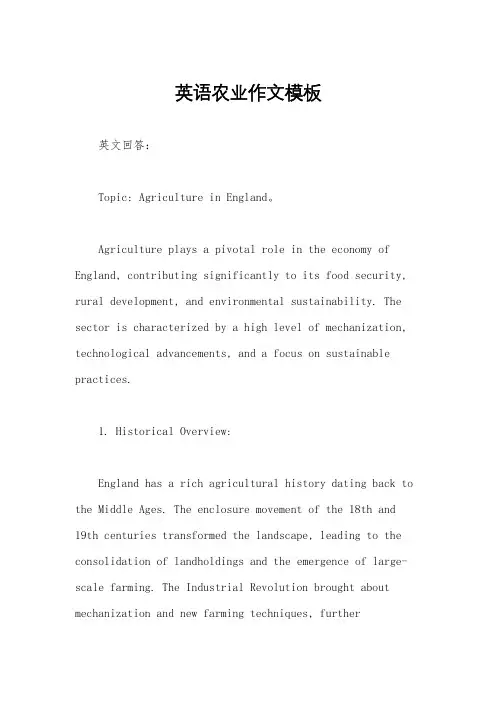
英语农业作文模板英文回答:Topic: Agriculture in England。
Agriculture plays a pivotal role in the economy of England, contributing significantly to its food security, rural development, and environmental sustainability. The sector is characterized by a high level of mechanization, technological advancements, and a focus on sustainable practices.1. Historical Overview:England has a rich agricultural history dating back to the Middle Ages. The enclosure movement of the 18th and19th centuries transformed the landscape, leading to the consolidation of landholdings and the emergence of large-scale farming. The Industrial Revolution brought about mechanization and new farming techniques, furtherrevolutionizing the industry.2. Current Agriculture:Today, England's agriculture is a diverse sector that produces a wide range of crops and livestock. The major agricultural regions include the arable eastern and central regions, the dairy and livestock-producing west and southwest, and the horticultural south. Key crops include wheat, barley, oilseed rape, sugar beet, and potatoes. Cattle, sheep, and pigs are the main livestock types.3. Key Technological Advancements:Technological innovations have significantly transformed English agriculture. The use of precision farming techniques, such as GPS-guided tractors and drones, has improved efficiency and reduced environmental impact. Automated milking systems and robotic feed dispensers enhance livestock management. Biotechnology has enabled the development of disease-resistant crops and increased livestock productivity.4. Sustainable Practices:Sustainability is a top priority in English agriculture. Farmers adopt practices such as crop rotation, cover cropping, and integrated pest management to maintain soil health, protect water quality, and reduce pesticide use.The government provides incentives and support for environmentally friendly farming practices.5. Challenges and Future Prospects:Despite its advancements, English agriculture faces several challenges. These include climate change, which affects crop yields and livestock production; market volatility; and global competition. The future of thesector depends on continued innovation, sustainable practices, and policies that support farmers.中文回答:话题,英国农业。
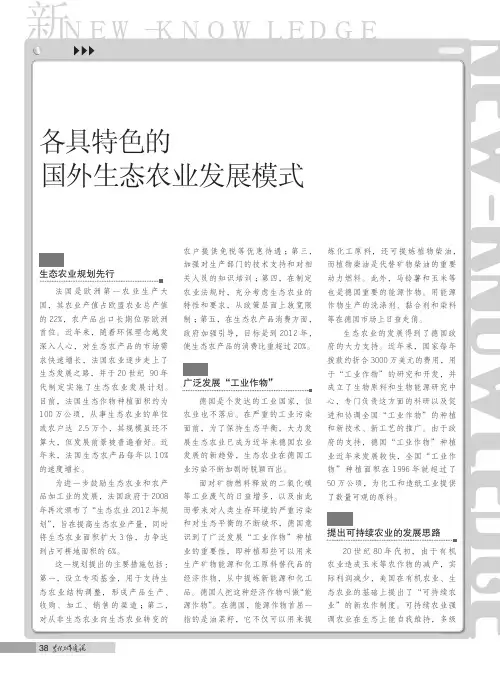
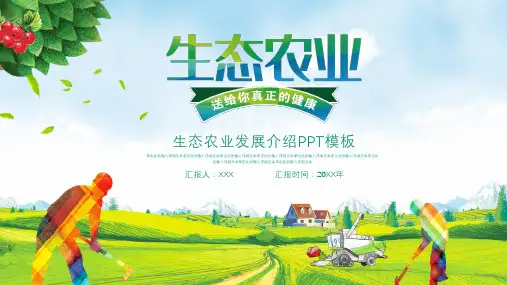
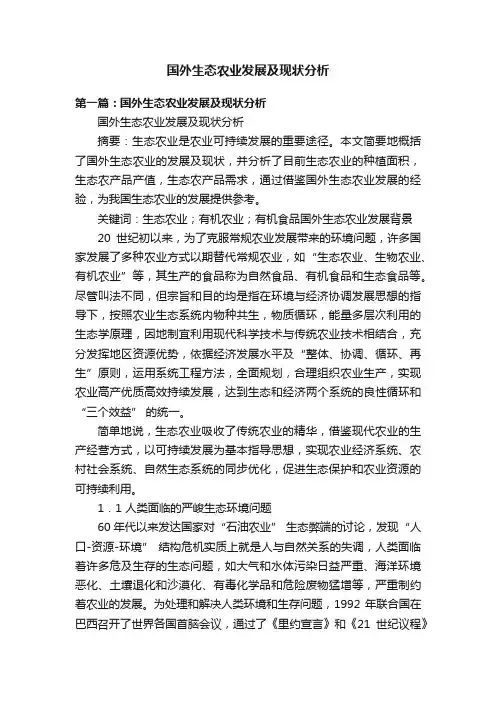
国外生态农业发展及现状分析第一篇:国外生态农业发展及现状分析国外生态农业发展及现状分析摘要:生态农业是农业可持续发展的重要途径。
本文简要地概括了国外生态农业的发展及现状,并分析了目前生态农业的种植面积,生态农产品产值,生态农产品需求,通过借鉴国外生态农业发展的经验,为我国生态农业的发展提供参考。
关键词:生态农业;有机农业;有机食品国外生态农业发展背景20世纪初以来,为了克服常规农业发展带来的环境问题,许多国家发展了多种农业方式以期替代常规农业,如“生态农业、生物农业、有机农业”等,其生产的食品称为自然食品、有机食品和生态食品等。
尽管叫法不同,但宗旨和目的均是指在环境与经济协调发展思想的指导下,按照农业生态系统内物种共生,物质循环,能量多层次利用的生态学原理,因地制宜利用现代科学技术与传统农业技术相结合,充分发挥地区资源优势,依据经济发展水平及“整体、协调、循环、再生”原则,运用系统工程方法,全面规划,合理组织农业生产,实现农业高产优质高效持续发展,达到生态和经济两个系统的良性循环和“三个效益” 的统一。
简单地说,生态农业吸收了传统农业的精华,借鉴现代农业的生产经营方式,以可持续发展为基本指导思想,实现农业经济系统、农村社会系统、自然生态系统的同步优化,促进生态保护和农业资源的可持续利用。
1.1 人类面临的严峻生态环境问题60年代以来发达国家对“石油农业” 生态弊端的讨论,发现“人口-资源-环境” 结构危机实质上就是人与自然关系的失调,人类面临着许多危及生存的生态问题,如大气和水体污染日益严重、海洋环境恶化、土壤退化和沙漠化、有毒化学品和危险废物猛增等,严重制约着农业的发展。
为处理和解决人类环境和生存问题,1992年联合国在巴西召开了世界各国首脑会议,通过了《里约宣言》和《21世纪议程》等一系列主要文件,一致承诺把走可持续发展的道路作为未来全球经济和社会长期共同发展战略,进一步确定了可持续农业的地位,可持续农业已不是一种选择,而是一种必然。
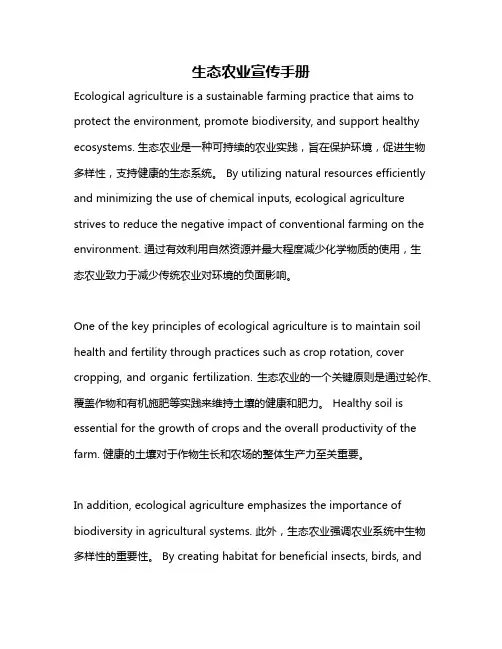
生态农业宣传手册Ecological agriculture is a sustainable farming practice that aims to protect the environment, promote biodiversity, and support healthy ecosystems. 生态农业是一种可持续的农业实践,旨在保护环境,促进生物多样性,支持健康的生态系统。
By utilizing natural resources efficiently and minimizing the use of chemical inputs, ecological agriculture strives to reduce the negative impact of conventional farming on the environment. 通过有效利用自然资源并最大程度减少化学物质的使用,生态农业致力于减少传统农业对环境的负面影响。
One of the key principles of ecological agriculture is to maintain soil health and fertility through practices such as crop rotation, cover cropping, and organic fertilization. 生态农业的一个关键原则是通过轮作、覆盖作物和有机施肥等实践来维持土壤的健康和肥力。
Healthy soil is essential for the growth of crops and the overall productivity of the farm. 健康的土壤对于作物生长和农场的整体生产力至关重要。
In addition, ecological agriculture emphasizes the importance of biodiversity in agricultural systems. 此外,生态农业强调农业系统中生物多样性的重要性。
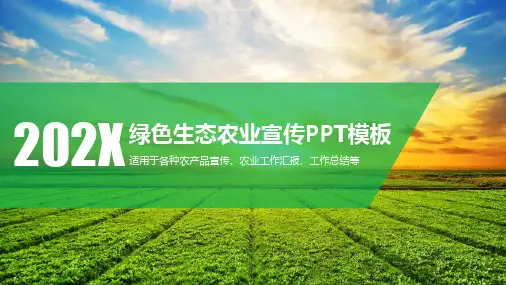
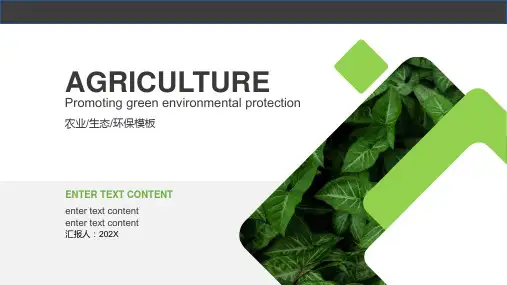
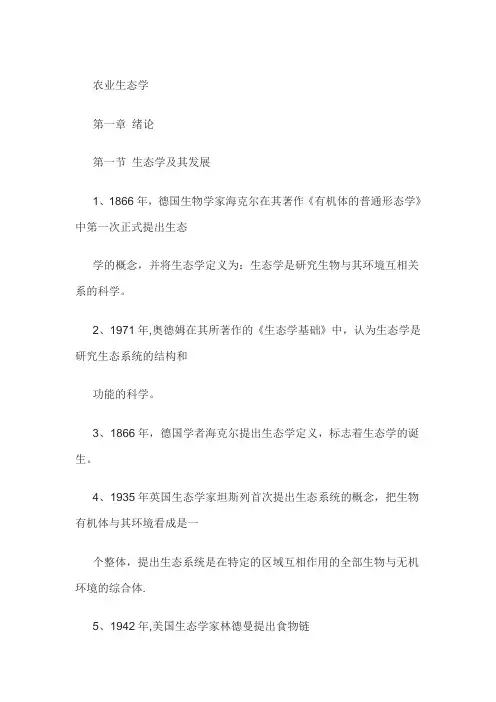
农业生态学第一章绪论第一节生态学及其发展1、1866年,德国生物学家海克尔在其著作《有机体的普通形态学》中第一次正式提出生态学的概念,并将生态学定义为:生态学是研究生物与其环境互相关系的科学。
2、1971年,奥德姆在其所著作的《生态学基础》中,认为生态学是研究生态系统的结构和功能的科学。
3、1866年,德国学者海克尔提出生态学定义,标志着生态学的诞生。
4、1935年英国生态学家坦斯列首次提出生态系统的概念,把生物有机体与其环境看成是一个整体,提出生态系统是在特定的区域互相作用的全部生物与无机环境的综合体.5、1942年,美国生态学家林德曼提出食物链6、20世纪30年代,贝塔朗菲提出系统论;40年代美国科学家香农创立信息论。
7、生态工程是20世纪60年代有奥德姆和马世俊分别提出的。
8、生态学按其性质一般分为理论生态学和应用生态学两大类。
第二节1、1983年正式确定在农业院校开设农业生态学课,并在1986年有国家教委将农业生态学列为农学专业的主要课程,同时在部分农业院校开始试办农业生态专业。
第三节1、农业生态学的研究对象主要是农业生态学系统。
2、农业生态学的主要内容包括农业生态系统的组成、结构、功能及其调控的原理和技术途径。
3、农业生态学的特点:理论实用性、学科交叉性、研究统一性、宏观层次性第二章第一节1、系统:有互相依赖的若干组分结合在一起,能完成特定功能,并朝特定目标发展的有机整体。
2、一个系统的组成,必须满足3个条件:第一,系统必须具备两个以上的构成要素:第二,各要素之间必须具有某种联系;第三,各要素必须以整体的形式完成特定的功能。
3、系统的特征:系统结构的有序性、系统的层次、系统的整体性、系统功能的整合性4、生态系统:在一定的时间和空间范围内,生物与生物之间、生物与非生物环境之间密切联系、相互作用并具有一定结构及完成一定功能的综合体,或者说是由生物群落与非生物环境互相依存所组成的一个生态学功能单位.5、1935年,英国生态学家A.G。


2024年生态农业项目建设计划书模板项目名称:2024年生态农业项目建设计划书一、项目背景和目标:2024年生态农业项目旨在利用现代科技和生态理念,推动农业的可持续发展,促进农业产业与环境的和谐发展。
通过引入新技术、改善农业生产方式和提高农产品质量,实现农业产业的绿色化、生态化和可持续发展。
项目目标:1. 提高农产品质量:通过科技创新和良好的管理方法,提高农产品的营养价值和品质,满足消费者对高品质农产品的需求。
2. 推广生态农业理念:通过示范和培训,向农民推广生态农业的理念和技术,引导其转变传统农业观念,采用生态友好的农业生产方式。
3. 保护农业生态环境:通过合理使用农业资源、科学施肥和生物防治等措施,减少农业对环境的负面影响,促进农业与环境的协调发展。
4. 提高农民收入:通过提高农产品产量和品质,降低生产成本,促进农民增收致富。
二、项目内容和实施计划:1. 科技创新和示范:- 引进先进的农业科技,包括高效水利技术、精准施肥技术、智能农机设备等,提高农业生产效率和品质。
- 在示范农场建设生态农业示范基地,推广新技术和管理方法,吸引农民参观学习,提高他们的生态意识和技能。
2. 农业废弃物资源化利用:- 建立农业废弃物资源化利用系统,通过生物降解、沼气发酵等技术将废弃物转化为有机肥料、动物饲料等有价值的农产品。
- 推广废弃物资源化利用的技术和方法,鼓励农民将农业废弃物进行有效处理和利用,减少对环境的污染,降低农业生产成本。
3. 生态保护和生物多样性:- 制定科学的农业生态保护规划,减少农业对生态环境的破坏,并积极恢复和保护生态系统。
- 推广生物防治等生态友好的病虫害防治方法,减少化学农药的使用,保护农田生态环境和生物多样性。
4. 培训和咨询服务:- 组织农民培训班和技术研讨会,向农民介绍生态农业的理念和技术,提供相关技术培训和咨询服务。
- 建立生态农业技术咨询服务中心,为农民提供技术咨询、种植指导、病虫害防治等服务。